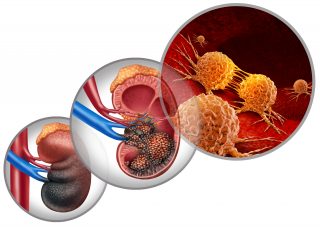Home >> Urological Cancer
Urological Cancer Treatment in Pune

Urological cancer refers to cancers that affect the organs of the urinary system and male reproductive system. The main types of urological cancer include:
1.Bladder Cancer:
- Bladder cancer usually begins in the lining of the bladder and can spread to the muscle layers if not treated early.
- Common symptoms include blood in urine, frequent urination, and pain during urination.
- Risk factors include smoking, exposure to certain chemicals, and history of bladder infections.
- Treatemnt optoins include , transurethral resection of bladder tumour ( TURBT ) BCG therapy, bladder removal ( radical cystectomy) and chemo radiothrerapy.
2.Prostate Cancer:
- Prostate cancer develops in the prostate gland, a small walnut-shaped organ that produces seminal fluid.
- It is one of the most common cancers in men, especially older men.
- It is diagnosed by prostate biopsy and spread is known by doing PSMA PET
- Options for localised prostate cancer include robotic radical prostatectomy / radiation therapy.
- For metastatic disease, the options are hormonal therapy, chemotherapy and immunotherapy.
3.Kidney Cancer:
- Kidney cancer originates in the kidneys, the organs responsible for filtering waste from the blood to form urine.
- Common symptoms include blood in urine, persistent back pain, and a lump in the abdomen.
- Smoking, obesity, and high blood pressure are among the risk factors for kidney cancer.
Treatment Options:
- partial removal of kidney/partial nephrectomy ( open or Laproscopic or robotic
- Complete removal of kidney for large cancers (Radical nephretomy )
4.Testicular Cancer:
- Testicular cancer occurs in the testicles, which are responsible for producing sperm and testosterone.
- It is relatively rare but tends to affect younger men.
- Symptoms may include a lump or swelling in the testicles, pain or discomfort, and a feeling of heaviness.
- The exact cause is unknown, but risk factors include undescended testicles and a family history of testicular cancer. The treatemnt includes removing testis ( high inguinal orchidectomy), chemotherpy and RPLND( retropertionial node dissection)
5.Penile Cancer:
- Penile cancer develops on the skin or tissues of the penis.
- It is rare and often appears as a sore, lump, or discoloration on the penis.
- Risk factors include smoking, poor hygiene, and certain infections, such as human papillomavirus (HPV).
- Treatemnt option include partial or total penectomy, chemotherpy and importantly groin node dissection.
For expert urological cancer treatment in Pune, contact us today to schedule a consultation and take the first step toward better health.
